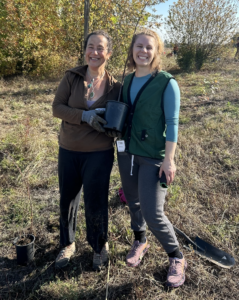November 1, 2024
OCHIN has received its first grant focused on the role of climate change in health equity. Funded by the National Institutes of Health (NIH), the $3.7 million, three-year CATALYST (Community climATe heALth equitY reSearch cenTer) project will establish the infrastructure for OCHIN to become a Climate Change and Health Research Center that can support community health centers in reducing the health impacts of climate change on their patients. CATALYST is OCHIN’s first center planning grant (P20) and one of its first prime awards from NIH.
Climate change is increasingly leading to temperature extremes, poor air quality from wildfire smoke, flooding, and severe weather events, all of which negatively affect health and worsen existing health disparities. Community health centers are often the first stop for patients in the health care system and are trusted providers of culturally competent care, placing them on the front lines of addressing climate-related health impacts.
“Low-income communities are already disproportionately affected by climate change, and it will get worse. Community health centers are well-positioned to address these impacts,” said Rachel Gold, PhD, MPH, OCHIN’s director of implementation science programs and co-principal investigator of CATALYST. “This project will identify the evidence our clinics need to intervene and create the data infrastructure and expertise required to generate that evidence going forward. OCHIN is ideally poised to become a national leader in researching how community health centers can address the health impacts of climate change on their patients.”


Rachel Gold


Karen Albright


Rachel Gold and Anna Steeves-Reece attend a tree-planting event to mark the unofficial kickoff of the CATALYST project.
To effectively prepare for and reduce these impacts, clinics need data on health impact patterns within their communities, interventions to disrupt these patterns, and strategies for implementing those interventions effectively. Co-led by Karen Albright, PhD, MSW, MA, OCHIN’s director of community-engaged research, and Hossein Estiri, PhD, MS, co-lead of the Harvard Confluence Project, CATALYST will lay the groundwork for generating this critical evidence by:
- Creating a unique dataset that combines OCHIN’s national community health centers’ electronic health record (EHR) data with information on temperature and air quality to identify patterns of health impacts caused by climate change in community health center populations
- Sharing results with community partners to determine which specific evidence community health centers prioritize for addressing these patterns
- Developing two proposals for research funding to begin generating this evidence
- Bringing together advisory groups made up of clinic staff and patients from six diverse OCHIN members, leaders from community advocacy organizations, and scientists to collectively guide all CATALYST activities
- Collaborating with OCHIN’s informatics team to develop EHR-based tools that clinics can use to reduce the health impacts of climate events on their patients
CATALYST will focus on how extreme heat and poor air quality impact hypertension and asthma in community health center patients. It will emphasize how social drivers of health interact with climate events to impact overall health and explore how local and national policies can support clinics in their efforts to reduce the health effects of climate change. And it will lay the groundwork for future research on other climate-related events, such as tornadoes and flooding, as well as additional health outcomes like maternal health.
In addition to principal investigators Gold and Albright, OCHIN staff working on CATALYST include: Erika Cottrell, Arwen Bunce, Brenda McGrath, Anna Steeves-Reece, Rose Gunn, Maura Pisciotta, and Dave Boston.
Contract investigators on the project include John Heintzman and Laura Gottlieb.
To learn more about CATALYST and its funding, visit NIH’s website.
CATALYST is supported by the National Institute on Minority Health and Health Disparities of the National Institutes of Health under Award Number P20MD019799. The content of this announcement is solely the responsibility of the authors and does not necessarily represent the official views of NIH.













